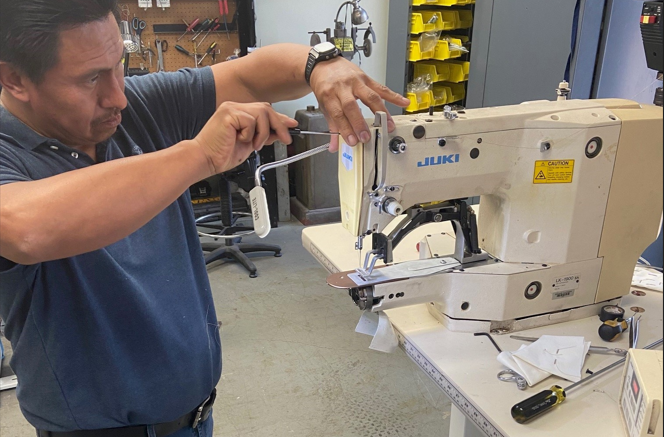What does a sewing machine mechanic do? They fix sewing machines, naturally. How important is that though? That is a question that isn’t typically considered by either consumers, or by manufacturers that do not have sewing machines. How does it impact your supply chain? What does can we learn from this about many other trade skills?
- What Happened to the Mechanics?
What happened to the Sewing Machine Mechanics? In 1990, there were well over 5,000 of them scattered across South Carolina, caring for an estimated One million industrial sewing machines. As the plants closed, they were to work somewhere else. A mechanic that can care for sewing machines can also care for many other things, so they found ready work somewhere else. There were far more qualified workers than there were available jobs, as the industry was in decline. A declining industry does not attract young workers, and the seeds of a modern crisis were born. For nearly 30 years, the number of young, new Sewing Machine Mechanics has been perilously close to zero. Why would they? It is a technical, challenging job that pays poorly, and for decades, any new mechanic would be competing with dozens of older, more qualified people competing for the dwindling number of jobs. It was a terrible career path.
As we enter 2024, this dynamic is long past. Those older mechanics workers are leaving the workforce in huge numbers, most of them are long gone, and those that remain talk about their careers in terms of weeks or months to retirement. There are now far more jobs than there are people, but the career remains undercompensated, underappreciated, and the infrastructure to train and mentor young mechanics does not exist.
- Why does it matter to the broader industry?
Let us talk about what the sewing industry does in South Carolina. For the most part, it does not make clothes. It doesn’t produce many finished goods at all. What it DOES do is support supply chains for more complex products. Lockheed Martin cannot build F-16s without seats, engine thermal shrouds, aircraft recovery parachutes, and hundreds of other sewn components. Nobody wants a BMW without comfortable seats, and quality upholstery, and they won’t pass safety requirements without quality seatbelts. A significant amount of this is provided by local, small manufacturers, which drives down costs and shortens lead times.
Everything that is sewn is sewn on an industrial sewing machine, and these machines break down. With a dwindling number of aging mechanics to fix them, the economic costs across South Carolina are mounting every week, and few even realize where the problems are coming from. It is disturbingly common to trace millions of dollars of delays of high complex, expensive end items to a single, aging machine in a vendors’ facility, that nobody knows how to maintain any more.
- How do we fix it, and how large is this problem?
Not easily, and it is gigantic. Sewing Mechanics are far from the only example of this. Realistically, South Carolina does not need many people in this career. The huge apparel mills are gone, and not coming back. But we need some. We desperately need some. There are simply too many sewn products that must be sewn in South Carolina, either for security reasons (Like Military and Law Enforcement contracts) or for logistics or quality reasons (Like seat belts, cargo webbing, thermal products…).
We may only need a few hundred sewing machine mechanics in the entire state, but we need them to be good at their jobs, and we need a constant pipeline of them entering and exiting the workforce. This new generation will need to learn programming and AI tools, as the sewing industry desperately needs to modernize, but is being held back because young, tech savvy people simply do not want to work there. That has major impacts on the companies that rely on their outputs.
Other industries with similar impacts include Port Crane operators, without which ports like Charleston and Savannah cannot operate. Specialty mechanics for things like food processing equipment enable our agricultural output. Countless critical trade skills which need few workers, but those workers support thousands of other jobs each.
My company has partnered with SCMEP, the South Carolina Manufacturing Extension Program, and we started offering a Fundamentals Course for Sewing Machine Mechanics. This is the first such course that has existed in the Carolinas in 35 years and is currently the only one in the nation. It isn’t going to fix this crisis. It is a drop in the bucket of a much larger problem. But it is something. It is a step forward. It is at least an entry point into an industry that needs to continue, not just for the good of the sewing industry, but for all South Carolina Manufacturers.
This problem, and many like it, will continue to worsen. Our education system is constructed to prepare students for new, emerging, exciting jobs, and most critically, common jobs. It is poorly equipped to service career fields that may only need a dozen or less people entering per year. We pride ourselves on looking forward, not back, but we still need these skills. We still rely on these skills, and we must develop them. We need a conversation in this state about how to develop not just the jobs that our companies in particular need, but the ones that are holding up the entire structure on their shoulders.
About the Author
Caleb Doty is a multifaceted leader blending military excellence with corporate acumen – Owner of Americas 21, Former GE Professional, U.S. Army Captain, and Proud University of Houston Graduate.



Be the first to comment on "Cornerstone Trade Skills affect us all when they die out"